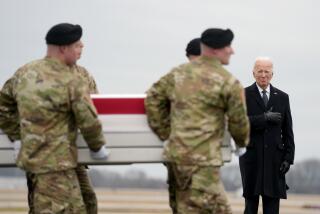U.S. and Iraqi Forces Mount Offensive
BAGHDAD â U.S. Marines and Iraqi forces began their second major offensive in four days in western Iraq on Tuesday, dropping bombs and recapturing a cluster of Euphrates River settlements at the hub of an insurgent infiltration route from Syria.
The U.S. military said five troops died Monday. A Marine, Cpl. John R. Stalvey, was slain in fighting in Karabilah. Three soldiers were killed outside Haqlaniya by a roadside bomb; they were not immediately identified. The troops were the first American casualties of the two offensives in Al Anbar province, an insurgent stronghold. Elsewhere in the province, a U.S. soldier died near Fallouja, far from the two offensives, the military said.
Residents of Haditha, the main target of the newest offensive, reported street fighting between insurgents and U.S. forces. They said American troops ordered people to stay indoors, opened fire from rooftops at motorists trying to leave town, and chased suspected insurgents into the hospital, where they detained the director and several patients.
In Baghdad, meanwhile, a suicide attacker set off a car bomb at the main entrance to the Green Zone, the heavily fortified district that houses Iraqi government ministries and the U.S. and British embassies. The blast killed three Iraqi policemen.
At least a dozen other Iraqis died in scattered violence across the country on the first day of Ramadan, the holy Islamic month of fasting. Al Qaeda in Iraq, the most violent and vocal insurgent group, urged its followers in a Ramadan message to intensify attacks and make it âa month of defeatâ for U.S. and Iraqi forces.
The coming weeks in Al Anbar province will test the ability of Iraqi forces to protect cities and towns secured by U.S. forces.
The offensive launched Tuesday, codenamed River Gate, brought Marines back to Haditha and the adjacent villages of Haqlaniya and Parwana two months after driving insurgents out of the area 130 miles northwest of Baghdad. U.S. forces suffered heavy losses in that early August assault; 14 Marines and their interpreter died when an armored vehicle hit a landmine.
Days after American forces left, however, militants were back in control, dominating a region of 100,000 people with no government presence or police force. U.S. officials say Haditha is a smuggling crossroads for Al Qaeda in Iraq, linking its infiltration route from the Syrian border to roads leading to Mosul, Ramadi, Fallouja and Baghdad.
This time, the Marines brought along what U.S. officials called the largest contingent of Iraqi troops to join in an anti-insurgent assault. Army Lt. Col. Steve Boylan, a U.S. military spokesman, said that about half the 2,500 troops taking part in the offensive were Iraqis.
âWhatâs different is there are more Iraqi forces in the field with more experience,â Boylan said, adding that some of them would remain behind to keep the insurgents from coming back.
Residents contacted by telephone in Haditha, however, said they saw no Iraqi forces alongside the Americans.
The assault began with predawn strikes by U.S. warplanes and helicopters that knocked out a bridge across the Euphrates and cut off electricity to the city and neighboring villages.
Using loudspeakers to warn residents to stay indoors, troops went door to door arresting suspected insurgents, witnesses said, and flooded the city with leaflets urging people to turn in others. The troops told people that they had come to enable the Iraqi government to establish civilian authority in the area.
People in Haditha say they have lived in fearful tolerance of the insurgents only because there was no other consistent armed presence. But residents contacted by telephone Tuesday spoke harshly about what they called a heavy-handed military invasion.
âIf they want to clean out our city, donât do it by shooting at our people,â said Ali Abed Allah, 44. âIf they want to bring in government officials, we can allow them to come in. There must be a more peaceful way.â
U.S.-led forces were in the fourth day of a similar offensive affecting Karabilah and two other cities about 90 miles upriver, targeting insurgents who receive reinforcements and supplies over the nearby Syrian border. At least 57 suspected insurgents have been killed in that operation, the U.S. military said.
Sheik Usama Aljadaan, a tribal leader reached by telephone in Karabilah, said U.S. soldiers had sealed off the city Saturday, bombed it, and moved in ground forces Tuesday. Although Iraqi forces are also officially part of the operation there, he said he had not see any.
U.S. officials say a goal of the offensives is to help Iraqi authorities set up polling places so people in Al Anbar can vote, free of insurgent threats, in an Oct. 15 referendum on a proposed constitution. On Tuesday, Al Qaeda in Iraq repeated its call for a boycott of the vote.
The Bush administration is counting on a yes vote to advance its plan for democratic institutions and undermine the Sunni Arab-led insurgency. Sunni political leaders in Al Anbar, who are urging their followers to vote no, have accused the United States of timing the offensives to disrupt communities and displace people to prevent them from voting.
Boylan, the military spokesman, denied that intention. But he said, âYou canât plan these operations to wrap up by a certain date.â
*
Times staff writers Shamil Aziz and Saif Rasheed in Baghdad and a special correspondent in Al Anbar province contributed to this report.
More to Read
Sign up for Essential California
The most important California stories and recommendations in your inbox every morning.
You may occasionally receive promotional content from the Los Angeles Times.









